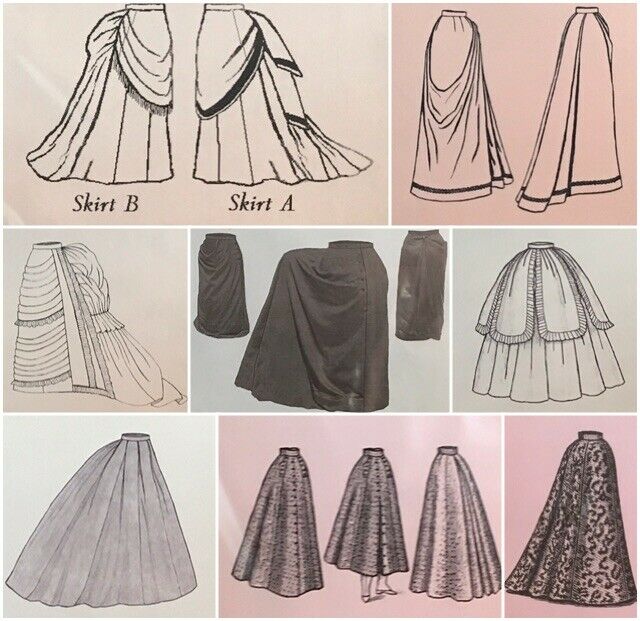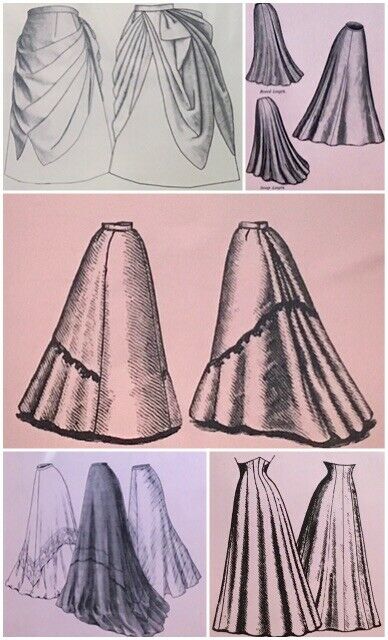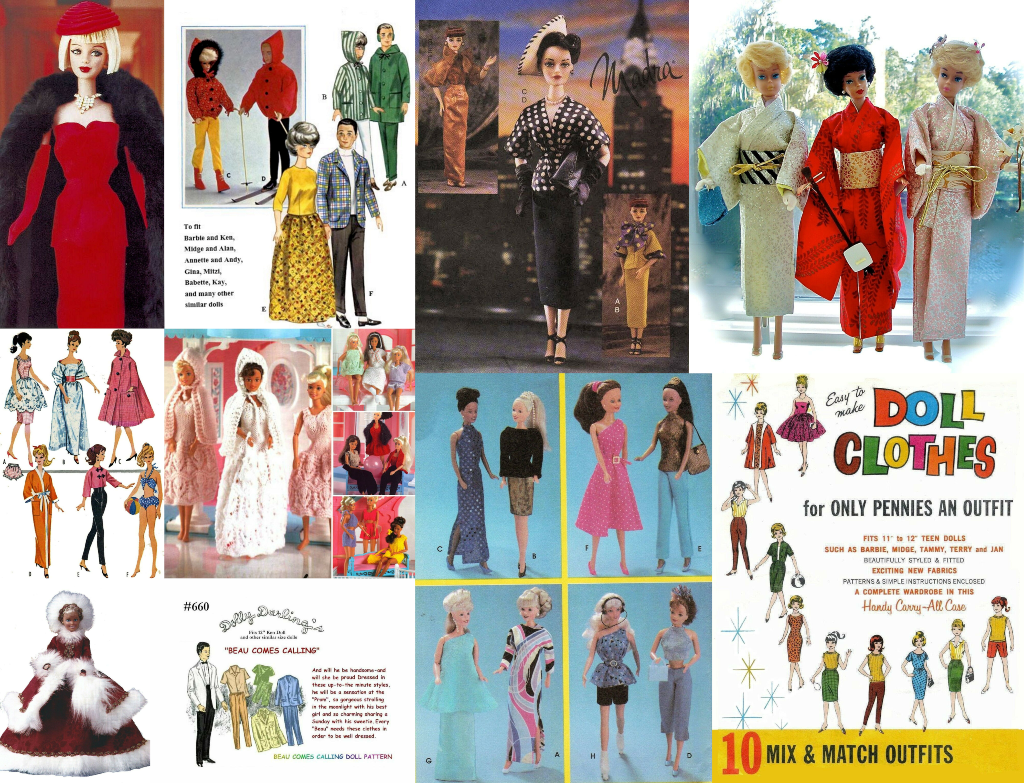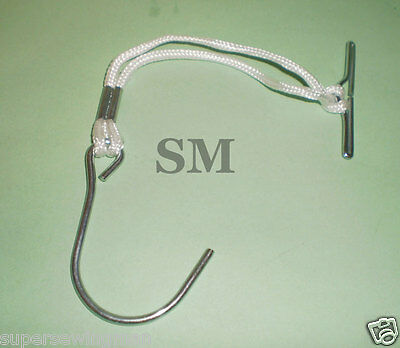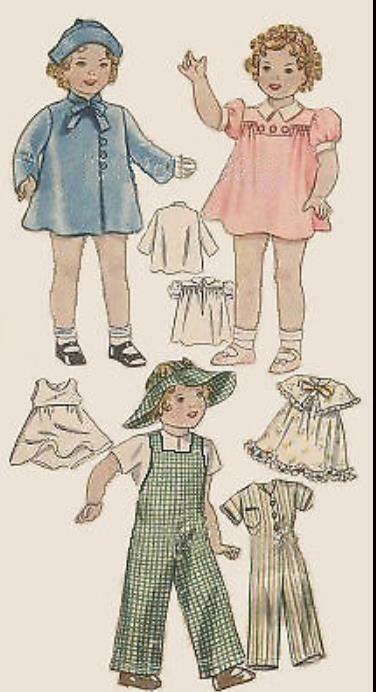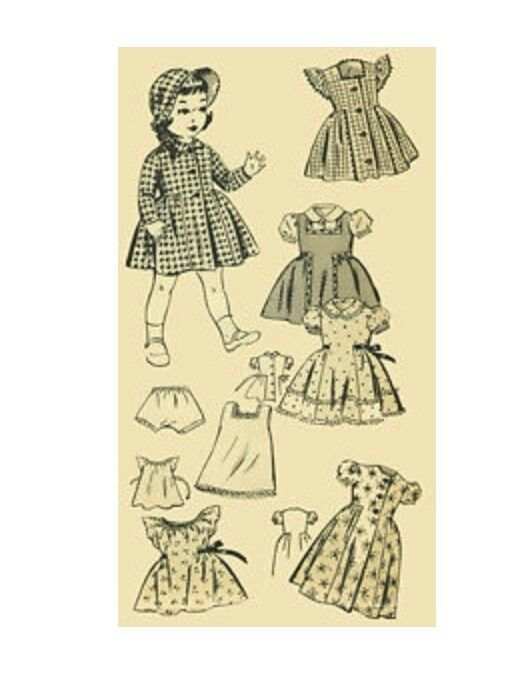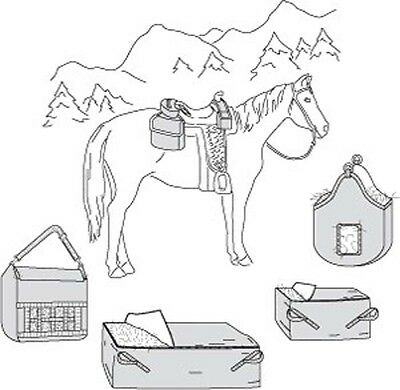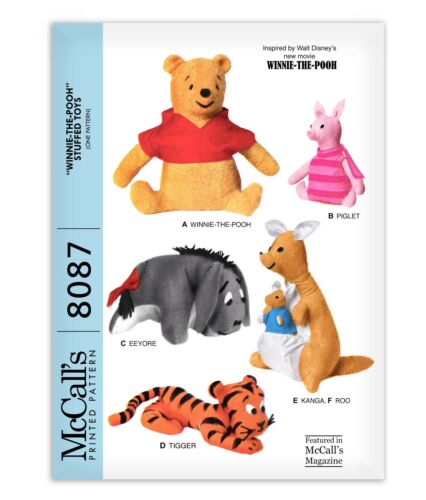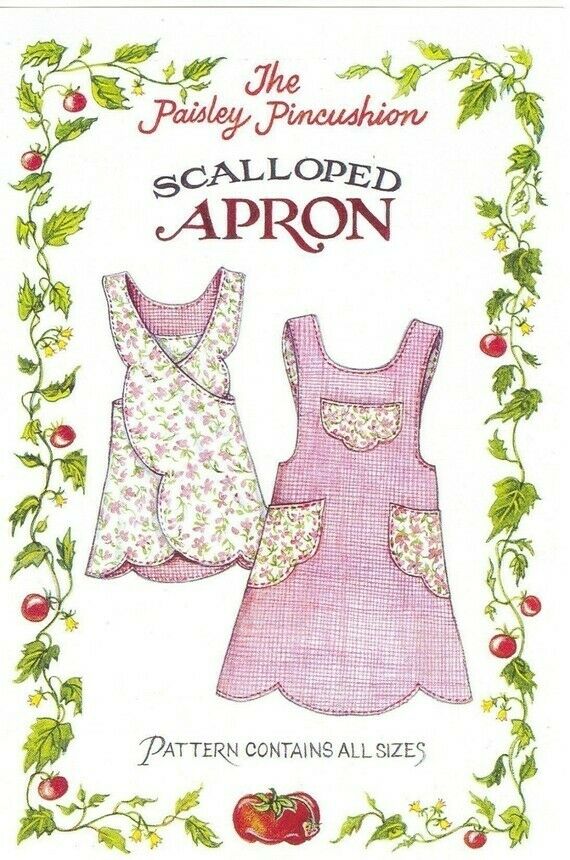-40%
Skirts, Overskirts, Corsets-Bustle-Underwear 1851-1903 Edwardian Truly Victorian
$ 3.69
- Description
- Size Guide
Description
#TV101Petticoat with Wire Bustle
This petticoat has a center front closure, and four hoop bones built into the back. A ruffled overlay falls down the back. Suitable for either 1870’s or 1880’s style bustle. Multi-sized x-small to xx-large included in pattern.
#TV102
Chemise and Drawers
The chemise is very simple and comfortable enough to wear under any garment. Taken from an original pattern of 1885, it fits well under off the shoulder evening wear as well as day wear. The neckline is low and wide, and fitted with a drawstring ribbon. The drawers have a semi-fitted waistband with side button closures. A drawstring back allows for easy fitting. The crotch seam is left open and is finished with facings. The legs are finished with a band and ruffle, just below the knee. Multi-sized x-small to x-large included in pattern.
#TV103
1865 Elliptical Cage Crinoline
The Elliptical cage crinoline was the main support foundation for the later-and post-Civil War period of 1863-1868. This type of crinoline offers maximum support capabilities for a perfect shape, combined with flexibility for comfortable wear. It's shape is narrow over the hips, close to the body in front, and dramatically expanded to the rear; the most popular shape for 1865-1866 skirts. It is 126" in circumference at the hem. One size fits most, and can be easily adjusted to size by letting out or taking up the tie strings inside.
#TV104
Late Victorian Collars and Cuff
This pattern has an assortment of chemisettes and cuffs, suitable for the 1870's. Collars I and J are suitable for the 1880s and 1890s. These chemisettes are perfect for filling in a low cut diner bodice, making it more suitable for day wear. Or they can add interest to a more conservative neckline. The cuffs can fill out wide sleeves, or give a nice finish to a narrow sleeve. There are two full chemisette styles, high neck and V-neck. Both have center front button closure, and have ties at the waist line to hold it in place. The high neck version has 5 collar styles, and the V-neck has 3 collars. There are 3 styles of under-sleeves with a variety of 5 cuffs. The first has a full gathered under-sleeve. Another is a fitted under-sleeve style. These two are great for filling in a wide sleeve. The last is a double cuff, or reversible cuff, that can be worn with a narrow sleeve. It has no under-sleeve, but has two styles of cuffs attached back-to-back at the wrist, either cuff being viewable as desired. Multi-sized Small to X-Large included in pattern.
#TV105
Combination Underwear
This is a chemise and drawers combined into one garment. Open crotch and center front button closure. With three necklines to choose from, it can be worn under any style bodice. A correct undergarment for the years 1878 - 1900. Multi-sized 30"-50" bust.
#TV108
Grand Bustle
This bustle is bigger than TV101, with a complete wire frame built in. Two rows of wire at the hem hold the skirt to the beautiful full shape all around, required for the early bustle years. Ruffles down the back soften the line. Multi-sized x-small to xx-large included in pattern.
#TV110
Late Victorian Corset
1880's This corset pattern is taken from an original pattern found in the May 31, 1886 issue of De Gracieuce, a Dutch magazine similar to Harpers Bazzar. It was published in several other magazines of the time as well, including La Mode Illustre and Harpers Bazzar. This pattern has been modified slightly to accommodate the different cup sizes and modern body types, but retains most of the original proportions and elegance of the original garment. This corset has 6 panels, a center front busk, and laces in the center back. Recommended fabrics: Twill, coutil, canvas, drill, etc. Sizes: Bust-A to Bust-DD are included in the pattern.
#TV121
Petticoat with Detachable Train
1879 This skirt gives support behind the knees to tie-back style skirts of 1877-1882. It is slim in front, with netting to hold the back with a center front closure. A detachable train buttons onto the hem of the petticoat. Natural form, does not fit over a bustle. Multi-sized x-small to xx-large included in pattern.
#TV141
Round Cage Crinoline
1858 This is the perfect hoop for under regular, round shaped skirts It has 10 hoop wires to support heavy skirts, and a bag at the hem to keep the wearer from stepping through the hoops. 126" at the hem. Center front closure. Easy to build and the correct shape for 1855-1862. Multi-sized, containing all the sizes up to 34" waist, 46" hip.
#TV142
Walking Cage Crinoline
1856 This is a smaller cage, 110" at the hem. It has a bell shape for the early hoop years of 1856-1862. Multi-sized, containing all the sizes as follow: Medium up to 29" waist, 41" hip Large 30-36"Waist, 42-48" hip, X-Large Over 37" waist, 49" hip.
#TV163
Imperial Tournure
1887 In a search for a bigger, better bustle Truly Victorian has come up with the Imperial Tournure. Tournure is the French term for bustle. Based on the lobster tail design, it has 7 wires in total. The upper wires are set in at an angle in a fan shape, which give a round outline to your bustle and plenty of strength to support your heaviest skirts. Ending a little above the knee, this bustle folds up easily to make sitting in any chair effortless. This bustle has side panels that wrap around the body to the front, which holds the bustle perfectly in place, and keeps it from shifting. This bustle comes in two sizes of prominence, Imperial and Regular. The Regular size is similar to the TV101/TV108 bustles. The Imperial size is quite a bit larger, and is perfect for 1887-88 impressions. The Imperial bustle may require length adjustments to our existing skirt patterns, which are discussed in the instructions. Multi-sized 20 inch waist to 46 inch waist included in pattern.
#TV201
1870's Underskirt
The full skirt has five front gores and a full width in back. The placket is in the left side back seam. A pocket is in the right side seam. An optional 12” ruffle can be added to the hem. Fits over a bustle. Multi-sized x-small to xx-large included in pattern.
#TV202
1869 Grand Parlor Skirt
This skirt is the style used during the transitional period of 1868 to 1872, when the hoop was giving way to the bustle. It is designed to be worn over TV108 Grand Bustle, or a small elliptical hoop. The very full skirt is fitted to the waist in front, with the extra fullness shifted to the back. It has the traditional five gores and a full width in back. The placket is in the left side back seam. A pocket is in the right side seam. The hem is floor length in front, gets longer at the sides and is demi trained with an 8" sweep in back. This skirt is suitable for just about any use. This skirt can be left plain, as many post civil war skirts were, or heavily decorated as in the 1870's. Mix and match over-skirts for different looks. This pattern can also be used for petticoats. Multi-sized x-small to 3x-large (20"- 44" waist) included in pattern.
#TV208
1870 Trained Skirt Ensemble
These skirts are drafted based on a tailoring method actually used in the 1870's. It is designed to be worn over a bustle. Skirt A has the traditional five gores and two widths in the back for train length. The full over-skirt is pulled up in the center back and has four sashes hanging down the back. Skirt B has the five gore front and a double width back, pleated at the side back for a "pouf". The front apron is also pleated on the sides for gentle swags. On both skirts, the placket is in the center back seam. An optional pocket is in the right side seam. Multi-sized x-small to xx-large included in pattern.
#TV216
1875 Parisian Trained Skirt
This skirt has double aprons in front and decorative side trimming. The top back can be made into large poufs or without. And has a very full train attached behind the knees. Multi-sized x-small to xx-large included in pattern.
#TV221
1878 Tie-Back Underskirt
The skirt is slim in front and is tied-back, to wrap around the body. It has the traditional 5 gores and a full back width. The closure is in the left side-back seam. An optional 12? ruffle can be added to the hem of the skirt. Natural form, no bustle. Multi-sized x-small to xx-large included in pattern.
#TV225
1878 Fantail Skirt
This skirt is very slim in front with 3 gores. The back is tied behind the knees on a shear tape and the train is shaped with a fan gores. Center back closure. Great as a formal underskirt, looks best when fully decorated. Natural Form, does not fit over a bustle. Multi-sized x-small to xx-large included in pattern.
#TV240
1860's Ball Gown Skirt
This is a very elegant hoop skirt with a top skirt falling in swags over a specially pleated ruffle. Can be made with contrasting fabrics for greater effect. This pattern is one size fits all. Fits over 120?, 135? and 150? hoops.
#TV241
1854 Flounced Skirt
Flounced skirts of all sorts were fashionable from 1843-1859. Our version has four flounces, or can be made with just three. Perfect for over TV142 - 1856 Walking Cage Crinoline. This pattern is one size fits all.
#TV244
1859 Double Skirt
This skirt pattern has two layers, just as the name implies. The skirt lining has a flounce added to give plenty of fullness over a hoop. The upper skirt covers the lining and the top of the flounce. This pattern is one size fits all, up to 150" hoop.
#TV246
1851 Petal Ball Gown Skirt
A beautiful Pre-Hoop skirt. The upper "petals" fall gracefully over the skirt. The very deep lower flounce adds enough fullness to go over a hoop, if desired. Multi-sized x-small to xx-large included in pattern.
#TV247
1865 Elliptical Skirt
This skirt is the style used during the late and post Civil War period. It is designed to be worn over TV103 Elliptical Cage Crinoline. The front and sides are gored, fitted to the waist with a pleat at each seam. The full back is tightly gathered into a few inches. This skirt has 9 panels in all, and is about 185" at the hem. The placket is in the center back seam. A pocket is in the right side seam. The hem is 42" long in front, lengthening in back to 49", for floor length all around the elliptical cage. This skirt will gracefully fall from the pleats at the waist, to floor. Multi-sized x-small to 3x-large included in pattern.
#TV263
1887 Imperial Skirt
This skirt is particularly suited to the years 1887-1888, and to fit over the TV163 - Imperial Tournure bustle. It has three train options: View A is floor length all around, and is perfect as the base skirt for walking dresses. It has a wide front gore, and narrow side gore which extends back over the bustle to give a narrow, but extended look to the back of the dress. The full back panel has a bournous pleat at the center, which also acts as the closure. View B has a moderate length train, suitable for evening gowns. The front is the same as for view A. It also has gores added to the side back seams to help the train fall smoothly to the floor. The extra wide back has the closure between the center back and side back panels. View C is a full court train, suitable for weddings or other formal events. The front and sides are the same as for view B, with the back being a double width square train. The back has two bournous pleats and a center back closure. Multi-sized 20-50" waist, 30-56" hips, all included in pattern.
#TV264
1883 Riding Habit Skirt
This riding skirt was worn while riding sidesaddle, and is historically correct for 1880-1885. It is shorter on the left hand side, longer on the right hand side, and shaped to fit over the right knee. When in the saddle, the hem should hang level front to back. For walking, the right knee has a loop which attaches to a button at the center back. When looped up the skirt becomes floor length all around, and drapes prettily on the right hip. Combine with TV464 for a very nice tailored looking habit, or any other bodice of the same fabric. Multi-sized 22-42" waist included in pattern.
#TV290
1889 Draped Skirt
All of the drapes are created by pleats off the waistband. The closure is in the center back. This skirt can also be made into an over skirt by bunching up the sides. This style was popular in the very late 1880?s. Sizes 20-40 inch waist are all included in pattern package.
#TV291
1898 Walking Skirt
This skirt it taken from an original Metropolitan Pattern, seen in the catalog in 1898. This is a basic 7 gore skirt, perfect for every day wear, tailor-made, and with blouses, for the years 1892 - 1902. Fitted front and gathers at the back waist, Center back closure. Multi-sized 20-44" waist included in pattern.
#TV292 1893 Bell Skirt
This skirt gives the beautiful A-line of the 1890's. It has a gored front. The sides are fitted with a dart, and the back is pleated very full into the center back. The seam across the middle back is historically correct. Comes in two train lengths. The closure is in the center back. Multi-sized x-small to xx-large included in pattern.
#TV294
1891 French Fan Skirt
This skirt is slim with gentle draping across the front. The demi-trained back is cut in fan shape and hangs in a large box pleat. The closure is in the left side seam. Multi-sized x-small to xx-large included in pattern.
#TV296
1895 Ripple Skirt
This skirt is the 1890?s at it?s best. The hem is a full 6 yards around with gored seams to fit smoothly at the waist. There are three box pleats in back. While the full side gores fall in graceful ripples. Multi-sized x-small to xx-large included in pattern.
#TV297
1898 Flared Skirt
The front panel extends the full length of the skirt, while the sides and back are cut with a fitted upper section and a tapered flare to add fullness at the hem. It has box pleats on either side of the center back closure. An optional kick pleat can be added to the front seams at the hem. This style of skirt was extremely popular from 1898-1903, and can be used for both day and evening wear. Multi-sized (waist 20-46) x-small to 3x-large included in pattern.
#TV298 1892 Unbrella Skirt with Train
This skirt is constructed all in one piece. The front is narrow and fitted with darts. The full back lies in folds with a center back closure. Requires minimum of 50” material for taller sizes. Multi-sized x-small to xx-large included in pattern.
#TV299
1901 Split Skirt
This pattern for a split skirt is taken from a tailoring guide of 1901. The Split Riding Skirt is ankle length, and the Bicycle Skirt is calf length. The center front has buttons to close the split. The center back has double box pleats to hide the split legs. There are two side front plackets with flaps for the closure. This skirt is suitable for riding, hiking, bicycling, hunting, and other sporting outfits. Multi-sized 22-42" waist included in pattern.
#TV301
1870's Tie-Apron Overskirt
The apron is flat in front, and has wide sashes that tie over the bustle and hang down the back. This over-skirt is suitable for a casual day dress. Fits over a bustle. Multi-sized x-small to xx-large included in pattern.
#TV303
1872 Side Drape Overskirt
The apron is lightly swagged in front with pleats at the side seam. The side back has pleated drapes hanging loosely down the side of the bustle. Two sashes hang from the center back. The closure is in the center back. Multi-sized x-small to xx-large included in pattern.
#TV304
1875 Square Overskirt
This Square overskirt was a very popular style in 1875 and 1876. It is designed to be worn with an underskirt and petticoat TV101. The apron is smooth in front with gathers at the side backs making "fans" over the top of the bustle. Between the fans is a pouffe back section with 2 tails falling below the poufs. The closure is in the center back. This skirt is suitable for a nice visiting skirt, or with elaborate trimming, would make a nice ball gown overskirt. Bordered fabrics would look especially nice, as the apron is cut on the cross grain. Many examples of this style have braid work or ribbon scrolled along the square edge. The back poufs were often of the contrasting fabric, but may also be the same fabric. Multi-sized x-small to 2x-large included in pattern.
#TV305
Bustled Apron Overskirt
This overskirt is swagged in front with pleats at the sides. The back has poufs held in place by tapes. It can be either round or pointed in front, and round or square in back. The closure is in the left side seam. Fits over a bustle. Multi-sized x-small to xx-large included in pattern.
#TV324
1878 Long Draped Overskirt
The gored front hangs in low swags with pleats at the sides. The back is pleated at the waist and left to hang low in swags. Inside tapes hold the skirt into a tie-back position. The closure is in the side back seam. Natural form, dose not fit over bustle. Multi-sized x-small to 3x-large (waist 20"-46") included in pattern.
#TV326 1880 Hermione Overskirt
This skirt is drafted based on an actual garment as seen in Demorest Monthly magazine. The front consists of an apron and pannier. The apron drapes to two points with pleats at the center front and sides. Over this is a pannier, which fans to the sides. The back is left to hang in low swags, and has a square tail for floor length skirts, or is in a oval for trained skirts. The closure is in the center back. If desired, this skirt can be also be sewn into the side seams of underskirt TV225 to create a single layered skirt. Multi-sized x-small 20"waist - 3x-large 44" waist.
#TV328 1880 Split Pannier Overskirt
Perfect for over the trained 1878 Fantail Skirt pattern TV225, but will work well with floor length skirt too. Very simple yet stylish with the open front, Pannier effect and low pouf behind the knees. Multi-sized xs-3x included in pattern.
#TV361
1880's Butterfly Detachable Train
This train can be attached to any existing skirt to make any walking skirt or an evening dress instantly. The "butterfly" hooks onto the lower edge of the bodice to give a beautiful one piece effect. Fits over a bustle. Multi-sized x-small to xx-large included in pattern.
#TV363 1887 Summer Overskirt
This skirt is drafted based on an actual garment as seen in an 1887 fashion magazine. It is designed to be worn with a four-gore underskirt and petticoat TV101 or TV108. The closure is in the center front.
Multi-sized waist 20"-46"
included in pattern.
#TV364
1886 Autumn Overskirt
The long, gored, front apron is heavily swagged with pleats high at the side back which disappear under the back drapery. It can be either pointed or rounded, in both front and back. The back has drooping poufs framed at the sides by a rippled "fall" on each side. The closure is in the center back. Multi-Size small-3X-large included in pattern.
#TV365
1883 August Overskirt
The front is heavily swagged to below knee length. The back is puffed at the top and the hem drapes into an oval. Ties inside help hold the shape. The closure is in the left side seam. Fits over a bustle. Multi-sized x-small to xx-large included in pattern.
#TV364
1886 Autumn Overskirt
The long, gored, front apron is heavily swagged with pleats high at the side back which disappear under the back drapery. It can be either pointed or rounded, in both front and back. The back has drooping poufs framed at the sides by a rippled "fall" on each side. The closure is in the center back. Multi-Size small-3X-large included in pattern.
#TV367
1887 Cascade Overskirt
This overskirt is drafted based on an actual garment as seen in the October 26, 1887 edition of La Mode Illustre. The front apron is a long swag, pulled up high onto the hips in large pleats that fan beautifully. A slit in the center front hem forms 2 points. The back is in two pieces, and falls in graceful cascades down the center back forming two points. The cascade is achieved through creative pleating, highlighted by 2 burnous pleats. The closure is in the center back. The apron is cut on the cross grain. This overskirt is ideal for lengthwise stripes, which would then go across on the front, and downward in the back. Any light to medium weight fabric will be suitable, however. Multi-sized 20-46" waist, 30-56" hips, all included in pattern.
#TV368
1887 Waterfall Overskirt
The apron hangs low in front and is pulled high over the hips at the back. The fan-shaped back is pleated very full and hangs in waterfall style to three points at the hem. Fits over a bustle. Multi-sized x-small to xx-large included in pattern.
#TV374 1886 Bordered Asymmetrical Overskirt
Designed for use with bordered fabrics. The border in front is high on the right side and low on the left side. The back is bouffant with burouse pleats, and bordered all around. The closure is on the right side. Multi-sized x-small to xx-large included in pattern.
#TV381
1885 Pannier Panel Add-On
This pattern is for a center front drapery, side panels, and a pannier that can be added to the TV261 Four Gore Underskirt. Each element can be used by itself or in any combination with the others. The front drapery is a shirred or pleated section that fits onto the front panel of TV261. The side panels extend forward of the front seams and fit into the back side seams. The Pannier drapery fits over the entire front TV261. Also included are instructions for using the TV261 pattern to make a double layered back with poufs, to add decoration to the back of the dress. Multi-sized x-small - 2x-large included in pattern. This pattern must be used with TV261 Four-Gore Underskirt.
#TV382
1886 Asymmetrical Add-On
This pattern is for an asymmetrical front and back drapery that can be added to the TV261 Four Gore Underskirt pattern. It is suitable for the years 1885-1889, and was especially popular in 1886 and 1887. The front apron has vertical pleats at the waist on the left hand side, and horizontal pleats on the right hand side. The back is the same, with vertical pleats on the left and horizontal pleats on the right. The drapery may be of matching fabric, or contrasting fabric. This drapery is usually cut on the cross grain, and works well with border prints or edged. This pattern must be used with TV261 Four-Gore Underskirt. Multi-sized x-small - 3x-large included in pattern.
#E01
Edwardian Corset
1903 This corset pattern is based on the styles seen in 1903. It has the low, full bust and long hip needed to create the "pigeon breast" look that was popular from 1902 - 1909. The corset is available in three heights; high bust, medium bust, and low bust, and comes in bust sizes A-DD. The hip is in three lengths: long, medium, and short. Also included are patterns for a hip pad and bust forms, which are needed to help finish out the figure. The instructions are for a single layer corset, which was the most typical of the period. Multi-sized 28-58" bust included in pattern.
#E02
Edwardian Underwear
Pattern includes a Chemise, open French Drawers and Corset Cover. The chemise has a square neck and gathers onto a yoke, at both front and back. The drawers can made with a round leg or shaped leg rising to a point on the outside. A straight ruffle can be added to either of the leg styles, or a handkerchief flounce can be added to the shaped leg. The corset cover can be made with ruffles across the front, or left plain. It can have shoulder straps and a false yoke for daytime, or be cut low with ribbon straps for evening wear, and either with or without ruffles across the front. The corset cover and drawers can also be sewn to the same waistband to make a Combinations. With so many variations available, this pattern should be able to serve all your Edwardian underwear needs. Multi-sized 30-56" bust, 22-48" waist included in pattern.
#E21
1903 Trumpet Skirt
Sometimes known as a Trumpet Skirt, this is a 7 gore flared hem skirt. This style of skirt was very popular from 1899 to about 1905. The early years start as very slim below the hip, but the skirts get fuller for 1903 and later. Our skirt is particularly suited to the years 1902-1905. It is fitted over the hip, moderately slim to a little above the knee, and then flares out dramatically to the hem. The back can be fitted in habit style with a 6" sweep, or in round length with a box pleat. The closure is in the center back. It has a separate skirt lining, or foundation skirt, with a ruffle at the hem to help support the flare. Multi-sized 20-46" waist included in pattern.
#E22
1905 Circular Skirt
Circular skirts were very popular in the mid 1904-1907, when very full, straight skirts were the most stylish. Known as a circular skirt in two parts, there is a seam at both center front, and center back. The back is fitted, in habit style, with a 6" sweep. The closure is in the center back. With the seams cut bias, this skirt is especially suited to stripes and plaids, which form a chevron effect at center front and center back. An optional band of fabric can be added to the skirt to simulate a pointed tunic. Multi-sized 20-46" waist included in pattern.
#E23
1906 Ten Gore Princess Skirt
This Ten Gore Princess Skirt has a raised waistline and is lightly flared to the hem. The raised waistline was also known as Empire Corsage, or Princess style. This skirt is lined and boned above the hip, like a corselet, to hold it's shape. The top has a raised point in the center back, and tapers lower to the center front. It has the smooth fitted back closed with hooks and eyes, known as the "habit" back. Hem line is at floor length. This skirt is perfectly suited to dresses of 1906 -1908, with it's wide hemline. Pair it with a blouse, and perhaps a long jacket or a copped Eton jacket. Sizes 20-46 inch waist are all included in pattern package.
Choose Item# to order
Free Shipping!!
